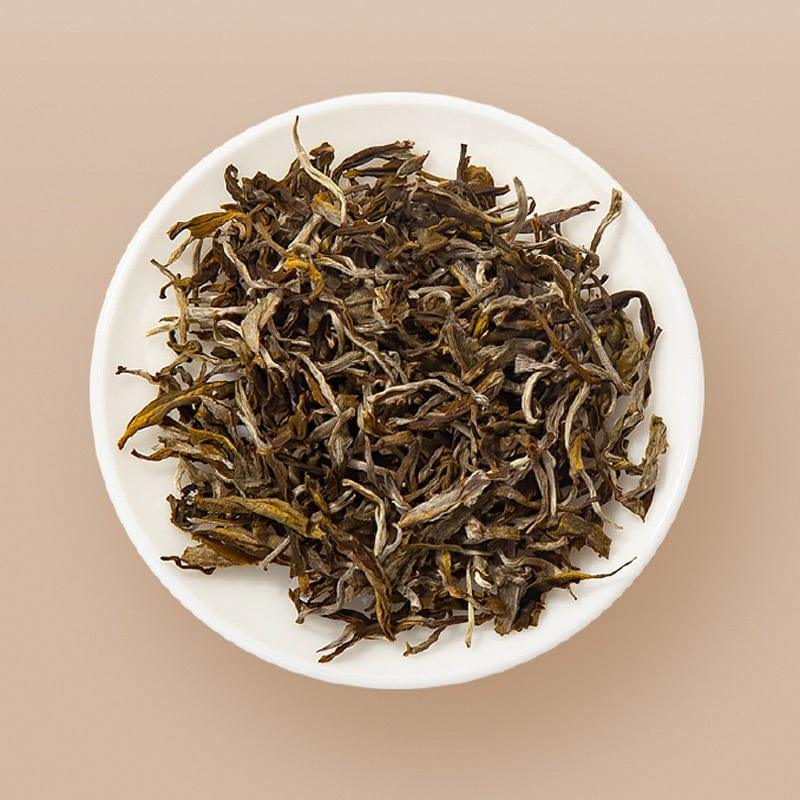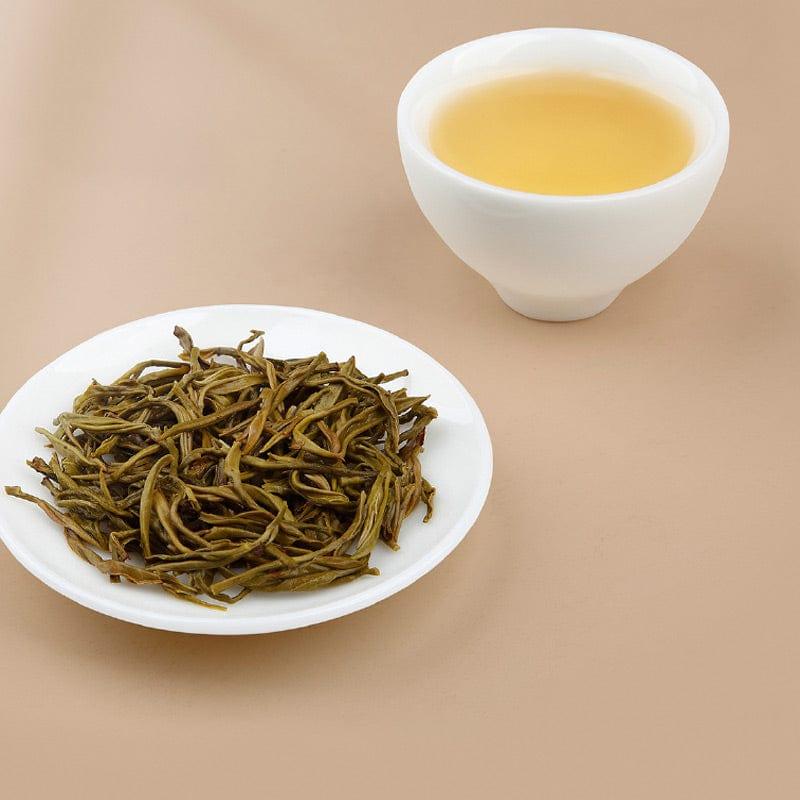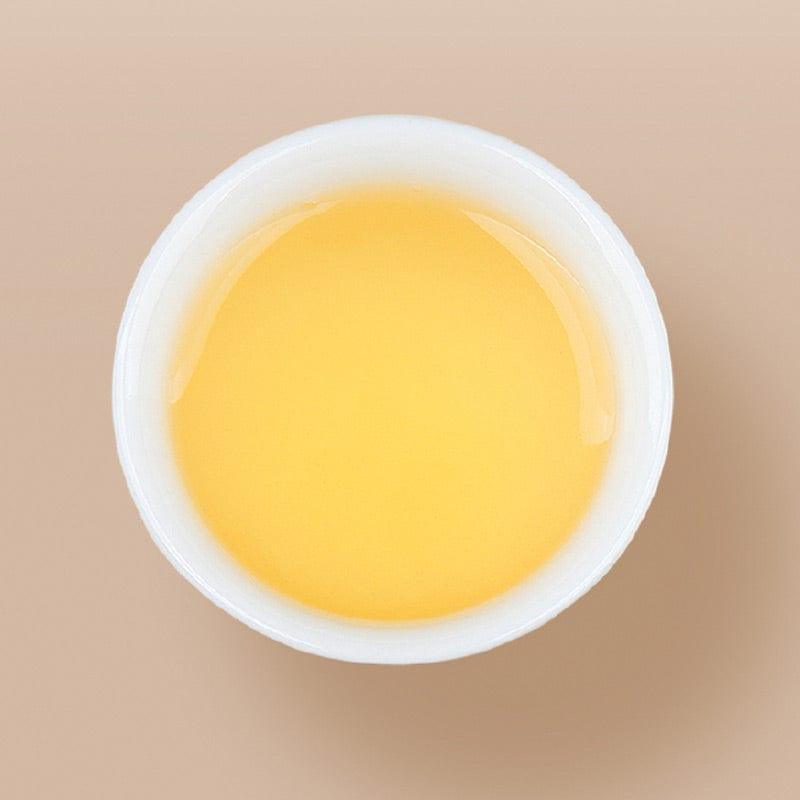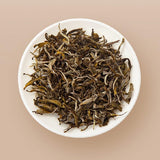Beigang Maojian
- Sale price
- $35.99
- Regular price
-
$38.99 - Regular price
- $35.99
- Unit price
- per
Couldn't load pickup availability
Product Description
Product Description
Beigang Maojian is a yellow tea with a long history, excellent quality, and rich cultural connotations. It is produced in Beigang, Yueyang City, Hunan Province, China. The leaves are plump and the buds are strong, with the tips of the leaves showing through and a golden colour. After brewing, the tea broth is bright orange-yellow, with a clear, lasting aroma. The tea leaves are tender, even and bright yellow, plump, and similar to a flower. Its quality characteristics are remarkable and unique. Beigang Maojian originated in the Tang Dynasty and is now a Chinese geographical indication product. It is not only a high-quality tea but also carries a wealth of cultural connotations. It is exported to many countries and regions overseas and has become a beautiful business card for Chinese tea culture.

Beigang Maojian Tea Details:
Product name: Beigang Maojian
Place of origin: Hunan Province, China
Net content: 125g
Production process: traditional process
Shelf life: 1080 days
Storage: cool, refrigerated, dry, away from light, and protected from odours
Beigang Maojian Picking and Production:
Our Beigang Maojian picking and production process has strict requirements:
Picking: Picking starts 5 to 6 days after Qingming, with each bud having two or three leaves. The leaves are picked on sunny days, and no insect-damaged leaves, purple leaves, or fish-like leaves are picked. The leaves are picked on the same day as they are made.
Fixation: This is commonly known as pan-frying. The fixation of Beigang Maojian is quite unique and very different from that of ordinary green tea and yellow tea. Beigang Maojian uses a high temperature for adding the leaves and a medium temperature for a long pan-frying process. Fixation requires a pan temperature of over 200 °C. After 2,000 grams of leaves have been added and shaken and fried for 2 minutes, the temperature is lowered to about 100°C, and the leaves are fried for another 12 to 13 minutes. When the tea has three to four thousand leaves, the pan temperature has gradually dropped to about 40°C, and the process is transferred to pan-kneading. During the relatively long pan-frying process, the high water content of the tea leaves causes considerable destruction of the chlorophyll, which lays the foundation for the unique qualities required for yellow tea.

Pot kneading: After fixation, the tea leaves are not removed from the pot. At a temperature of about 40°C and a moisture content of about 55%, the tea leaves are transferred to the pot for kneading, i.e., they are kneaded while being fried in the pot. This is interspersed with operations to break up the lumps. When the tea leaves have become stringy, they are removed from the pot and patted to remove the sweat.
Pat to remove sweat: The tea leaves are placed in a basket made of woven bamboo strips, tightly packed, and covered with a cotton cover to retain heat and moisture. Steep for 30 to 40 minutes to allow the tea leaves to rehydrate and turn yellow.
Frying and rolling again: After sweating, the tea leaves are fried again in a pan. The pan temperature is 60–70°C. Fry and roll the tea leaves while they are still hot until they curl up tightly and the white tips become visible. When they are about 80% dry, remove them from the pan and spread them out to dry.
Hot air drying: After air-drying, the tea is dried over a charcoal fire. After drying, the tea must be aired and then sealed in a box to mature. After maturing, the buds and leaves will be golden in colour and shiny, and the Beigang Maojian will have a high-quality, beautiful appearance
Beigang Maojian Brewing Method:
To brew a cup of Beigang Maojian tea with excellent colour, aroma, and taste, you really need to master certain tea-brewing techniques:
- Choosing tea ware: For brewing Beigang Maojian, it is best to use a glass or porcelain cup, as this allows you to clearly observe the unfolding of the tea leaves in the water, which adds to the enjoyment of the tea.
- Prepare the water source: Water quality has a significant impact on the taste of tea. For brewing Beigang Maojian, it is best to use spring water or mineral water, as this water quality can better highlight the aroma and taste of the tea.
- Control the water temperature: Water temperature is the key to brewing Beigang Maojian. Generally speaking, the ideal water temperature is between 80℃ and 85℃. An excessively high water temperature will destroy the nutrients in the tea leaves and make the tea broth bitter.
-
Measure the amount of tea leaves: According to personal taste and the size of the teaware used, generally put in 3-5 grams of tea leaves. Too many tea leaves will make the tea broth too strong, and too little will not have enough tea flavour. Therefore, before brewing, accurately measure the amount of tea leaves to ensure the taste and aroma of the tea broth.

Beigang Maojian Characteristics:
Appearance: High-quality Beigang Maojian has a tight, fine shape, a bright green colour, and white hairs showing, like needles. The tea leaves should be dry, free of inclusions, and of a consistent size and length. This appearance is not only pleasing to the eye but also an important indicator of the quality of the tea.
Smell the aroma: Open the package and hold it close to your nose to gently smell it. Fresh Beigang Maojian will emit a fresh, herbal aroma, sometimes with a light floral or bean fragrance.
Soup colour: Pour out the first brew of tea and observe the colour. The soup of high-quality Beigang Maojian tea should be a bright yellow-green or light green colour, clear and transparent
Observe the leaves: After brewing a few times, you can observe the tea leaves. The leaves of high-quality Beigang Maojian should be intact, bright green in colour, and free of red stems and leaves.

Beigang Maojian Benefits:
Lower blood pressure: The polyphenols and catechins in Beigang Maojian tea have a blood pressure-lowering effect. These ingredients can help dilate blood vessels, promote blood circulation, lower blood pressure, and have a certain adjuvant therapeutic effect on patients with hypertension.
Softens blood vessels: The active substances in tea can reduce the serum cholesterol and fibrin content in blood vessels, help lower blood lipids, soften blood vessels, and have a certain effect on preventing cardiovascular disease.
Antibacterial and antiviral: Beigang Maojian tea has antibacterial, antiviral, and disinfectant effects and is effective for cleaning small wounds, stopping bleeding, and relieving pain.
Refreshing and invigorating: Caffeine and other ingredients in tea can refresh and invigorate the mind, helping people stay awake and full of energy.
Our Privacy policy
Our Privacy policy
We offer free shipping on all of our teas. All you need to do is add the product to your cart, and than purchase to complete the transaction without having to pay extra for shipping.
We want you to be 100% satisfied with your purchase. Items can be returned or exchanged within 30 days of delivery.




Notified by email when this product becomes available





